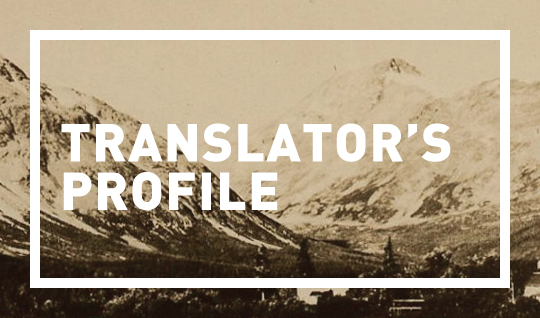Susan Bernofsky directs the literary translation program in the School of the Arts MFA Program in Writing at Columbia University. She has translated over twenty books, including seven by the great Swiss-German modernist author Robert Walser, Kafka’s The Metamorphosis, Hesse’s Siddhartha and, most recently, The End of Days by Jenny Erpenbeck. Her many prizes and awards include a Guggenheim Fellowship this year, as well as the Helen and Kurt Wolff Translation Prize and the Hermann Hesse Translation Prize. She blogs about translation at www.translationista.net.
***
Asymptote: Describe your current/most recent project. Why is it cool? What should we know about it?
Susan Bernofsky: I’m working on a gorgeous and bizarre novel about polar bears by Yoko Tawada called ETUDES IN SNOW. It’s a three-generation story inspired by the short, tragic life of Knut, the baby polar bear born in the Berlin zoo in 2006, but that’s just the jumping-off point for her novel. It’s really a book about identity (national, species, etc.) All the main characters in the book are polar bears, and are described in their physicality as polar bears, but at the same time they move in human society, without any acknowledgment that there might be a contradiction here. The grandmother character, born in the Soviet Union, becomes a writer. As an author of polar bear extraction, she’s an ethnic minority. She later emigrates to Canada, from where her daughter returns to Europe, landing in East Germany, where she takes a job at a circus and experiences the fall of the Berlin Wall. It’s a funny, sad, moving book.
What’s your pet peeve about the translation/literary industry?
At the moment I’m disheartened to see how skewed the industry is toward literary production by men. I’m sure you’ve seen Catherine Nichols’s recent article in Jezebel in which she talks about how she received 850 % more positive responses to her novel and cover letter when she submitted them under a male pseudonym. The same holds true in the translation world, with books by male authors far more likely (it’s shocking how much more likely) to be translated and then to be reviewed once published. I sat on a panel this spring that the PEN Translation Committee organized around this topic at the PEN World Voices Festival, inspired by the VIDA Count. There’s a pretty good gender balance among the translators themselves, though male translators are more likely to get picked for the top prizes.
What are you reading right now?
Monique Truong’s The Book of Salt. It’s a really gorgeous novel about the Vietnamese cook who worked for Gertrude Stein and Alice B. Toklas in Paris in the early 1930s. It turns out he had a pretty amazing inner life, at least in this fictional version. The language of the book is really sensual, especially when Truong is writing about food. I think I’ve gained a pound or two reading this one.
What language do you wish you could speak/read?
Hungarian, Arabic, or Chinese – because these are languages that are so difficult to learn I probably won’t learn any of them in my lifetimes, but all three have such incredibly rich literary traditions that I wish I could encounter them directly and not just through translation. I’m grateful to the translators who give me access to books from all the many languages I’ll never learn.
What was your favorite book as a child?
Never had one favorite, but I had a mother who would drive my sister and me to the library every Saturday when our ages were still in the single digits, and we always came home with a cardboard box filled with books that we would spend the rest of the week reading. The box of fresh books every week was so thrilling. For a long time my answer to the question “What’s your favorite book?” was, “Anything about horses.” I must have read the complete works of Walter Farley, Marguerite Henry, and also Laura Ingalls Wilder.
What should every young translator be able to do?
She should be able to intuit style, tone, and voice in a crosslingual context, which means developing the skills to “hear” the way a translation should sound, the way any other sort of writer does. Lots and lots of reading and years of practice will get you there.

